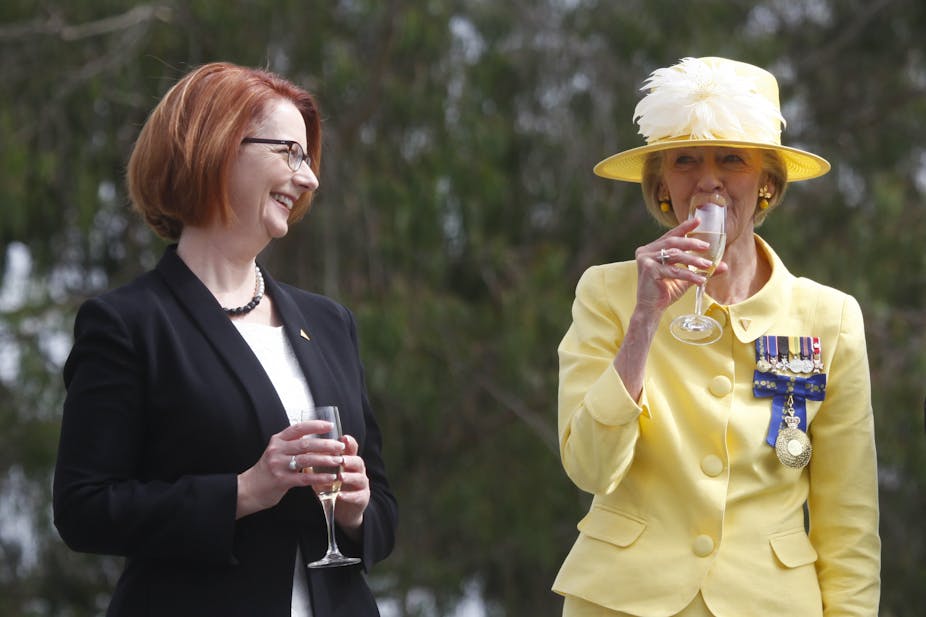Could the Gillard government appoint a successor to the Governor-General, Quentin Bryce, to take up office in March 2014 when Bryce’s appointment expires?
The press has reported that opposition leader, Tony Abbott, has expressed the view that the Gillard government should not make such appointments so close to the election, especially to fill positions that will only become vacant after the election.
Caretaker government conventions constrain the power of a government to make senior appointments during the caretaker period, which commences once Parliament has been dissolved. These are only conventions – not laws. They cannot be legally enforced.
However, they are well accepted by governments of all political persuasion across Australia. If an appointment cannot be deferred until after the caretaker period has ended, it is generally accepted that an acting appointment or a short-term appointment should be made and if this is not possible, then the Opposition should be consulted in relation to a full-term appointment.
An example of a breach of the caretaker conventions (which were less well developed at the time) occurred in South Australia in 1968. The South Australian Premier, Don Dunstan, recommended the appointment of Sir Mark Oliphant as Governor, just days before the state election and well after the state parliament had been dissolved.
In those days, Governors were appointed by the Queen on the advice of her British ministers. The British government, with the support of Buckingham Palace, declined to recommend Oliphant’s appointment to the Queen and delayed any appointment until after the election.
The new Premier, Steele Hall, requested the appointment instead of a different Australian, Sir James Harrison, who was appointed as requested. Oliphant later became Governor in 1971 after Dunstan was returned to office and was not subject to the caretaker conventions.

The rationale for the caretaker conventions is that the government ceases to be responsible to the Parliament for its actions, once the Parliament has been dissolved. Hence it should not take important actions, especially if they would commit an incoming government.
If the Gillard government made an appointment now, however, it would still be responsible to the Parliament for that appointment and could be held accountable for it in the Parliament. The Parliament is still intended to sit in May and June and it is not likely to be dissolved until August 2013. Hence, the Gillard governent remains entitled to make senior appointments. The fact that it has already announced the election date doesn’t affect its continuing responsibility to Parliament.
There is a good argument, however, that it is inappropriate for the government to make an appointment to fill an office which is not due to become vacant until March next year. In some cases, it may be appropriate to give an appointee a reasonable period of notice, especially if the person has to wind up business commitments first before taking up an office. But the announcement of a person to fill a position that will only become vacant in ten months time would appear to be both unusual and controversial, especially given the timing of an intervening election.
Finally, according to the press, one of the drivers behind making such an early appointment would be to prevent a former prime minister being made Governor-General. In 1958, the Premier of Tasmania, Robert Cosgrove, decided that the best way of achieving a comfortable retirement would be to recommend his own appointment as Governor of Tasmania.
The outgoing Governor was alarmed by the prospect and raised it with the British government. The British dealt with it cunningly by sending a message to Cosgrove that they had heard a slanderous rumour that he was going to recommend his own appointment as Governor.
They asked him to quash it, noting that Cosgrove would of course realise the “absolute undesirability and indeed impropriety of anyone of any party who had only just left active local politics being appointed to the office of Governor in any state”.
The British also consulted Robert Menzies about this. Menzies concluded that it was highly undesirable to say the least for a former state premier to be appointed as Governor of his own state.
The British Prime Minister, Harold Macmillan, agreed that he couldn’t submit such a name to the Queen.
Tony Abbott might like to ponder upon Menzies’ advice before making any submission of his own to the Queen if he wins government.

